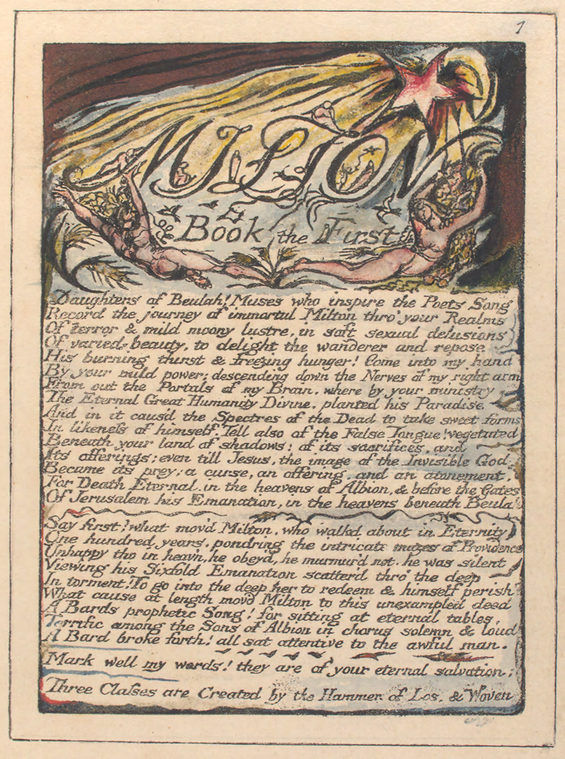 |
New York Public Library Milton Plate 2 |
MILTON
Book the First
Daughters of Beulah! Muses who inspire the Poets Song
Record the journey of immortal Milton thro' your Realms
The 'immortal Milton' has left Heaven for the time being
And in it caus'd the Spectres of the Dead to take sweet forms
By the False Tongue Blake meant among other things the religious
establishment of Britain, especially the mercenary bishops with
the sacrifices and offerings which they extort from the underlings.
even till Jesus, the image of the Invisible God
Became its prey; a curec, an offering, and an atonement,
They were and are responsible for the suffering and death of Jesus
For Death Eternal in the heavens of Albion, & before the Gates
Milton was not happy in Heaven because of his guilt feelings re
his former life. So he went back to fix things.
In torment! To go into the deep her to redeem & himself perish?
At the top is a large star, which is said to represent
Milton, then MILTON, Book the First.
Milton, then MILTON, Book the First.
Daughters of Beulah! Muses who inspire the Poets Song
Record the journey of immortal Milton thro' your Realms
Of terror & mild moony lustre, in soft sexual delusions
Of varied beauty, to delight the wanderer and repose
His burning thirst & freezing hunger!
The 'immortal Milton' has left Heaven for the time being
and entered the realm of Beulah, but not to rest, as some
do, but for the specific purpose of fixing what was wrong
in his former life.
................................... Come into my hand
By your mild power; descending down the Nerves of my right arm
From out the Portals of my Brain, where by your ministry
do, but for the specific purpose of fixing what was wrong
in his former life.
................................... Come into my hand
By your mild power; descending down the Nerves of my right arm
From out the Portals of my Brain, where by your ministry
The Eternal Great Humanity Divine. planted his Paradise,
This is a sardonic reference to the Creation according to the Bible.
This is a sardonic reference to the Creation according to the Bible.
And in it caus'd the Spectres of the Dead to take sweet forms
In likeness of himself. Tell also of the False Tongue! vegetated
Beneath your land of shadows: of its sacrifices. and its offerings;
By the False Tongue Blake meant among other things the religious
establishment of Britain, especially the mercenary bishops with
the sacrifices and offerings which they extort from the underlings.
even till Jesus, the image of the Invisible God
Became its prey; a curec, an offering, and an atonement,
They were and are responsible for the suffering and death of Jesus
For Death Eternal in the heavens of Albion, & before the Gates
Of Jerusalem his Emanation, in the heavens beneath Beulah
Say first! what mov'd Milton, who walkd about in Eternity
One hundred years, pondring the intricate mazes of Providence
Unhappy tho in heav'n, he obey'd, he murmur'd not. he was silent
Viewing his Sixfold Emanation scatter'd thro' the deep
Milton was not happy in Heaven because of his guilt feelings re
his former life. So he went back to fix things.
In torment! To go into the deep her to redeem & himself perish?
What cause at length mov'd Milton to this unexampled deed[?]
A Bards prophetic Song! for sitting at eternal tables,
Terrific among the Sons of Albion in chorus solemn & loud
A Bard broke forth! all sat attentive to the awful man.
Mark well my words! they are of your eternal salvation:
Three Classes are Created by the Hammer of Los, & Woven
PLATE 3
By Enitharmons Looms.....
***********************************************
Harold Bloom's commentary at the end of The Works of William Blake is the best, if not the only interpretive material on Blake's Book of Milton that I've found. He tells us that the large Falling Star at the top right corner of this plate signals the return of Milton from Heaven to Earth, but it frightens Urizen and Los; they are said to believe the falling star is Satan.
Blake drew on Paradise Lost in his Milton and it is also related to the story of Job, although it was much later that Blake brought out his Reflections on Job. The three of them are a treatment of the problem of Evil. (you may perceive that throughout Blake's Works he did not believe in Evil and thought it was not Evil, but rather Error.)
2 comments:
Hi Larry.
Your transcription reads
"Became its prey; a curec, an offering, and an atonement,"
A typo surely. To my eye the plate says "curse"
Thanks for your sharp eye.
The plate shows "curse", Erdman's hardcopy shows "curse", but the electronic version has "curec."
I attributed the misspelling to Blake who wasn't above such errors.
Post a Comment